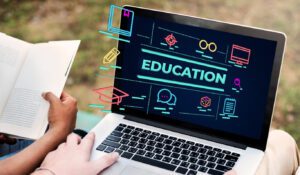The education landscape is undergoing a profound transformation driven by the relentless advancement of technology. Technology is irrevocably changing the way we teach and learn, from interactive whiteboards and virtual reality simulations to personalized learning platforms and artificial intelligence (AI)–powered tutors. This article delves into the multifaceted impact of technology on modern education, exploring its advantages, challenges, and the future it promises.
Empowering Personalized Learning:
Technology is breaking down the one-size-fits-all approach to education by enabling personalized learning experiences. Adaptive learning platforms, for example, use algorithms to tailor educational content to individual student needs and learning styles. This ensures students are challenged appropriately, fostering more profound understanding and engagement.
Enhancing Accessibility and Inclusivity:
Technology is making education more accessible and inclusive than ever before. Students with disabilities can now access learning materials through text-to-speech software, screen readers, and other assistive technologies. Additionally, educational resources are becoming increasingly available online, bridging geographical barriers and providing equal learning opportunities for students worldwide.
Boosting Collaboration and Engagement:
Technology fosters collaboration and engagement in the classroom. Interactive whiteboards, online discussion forums, and video conferencing tools enable students to collaborate on projects, share ideas, and learn from each other regardless of location. This collaborative approach promotes critical thinking, communication skills, and problem-solving abilities.

Revolutionizing Assessment and Feedback:
Technology is transforming how we assess student learning and provide feedback. Online quizzes and exams with instant scoring provide immediate insights into student progress, allowing for timely intervention and personalized support. AI-powered feedback tools can analyze student writing and provide constructive suggestions, accelerating learning.
Challenges and Considerations:
Despite its transformative potential, technology integration in education faces challenges. Digital equity remains a concern, with unequal access to devices and internet connectivity hindering some students’ participation. Additionally, overreliance on technology can distract students and hinder social interaction, requiring careful integration and responsible digital citizenship education.
The Future of EdTech:
The future of education technology is brimming with possibilities. Virtual reality (VR) and augmented reality (AR) experiences promise immersive learning environments, allowing students to travel virtually to historical sites, dissect virtual frogs, or explore the human body in 3D. AI-powered tutors will become more sophisticated, providing personalized guidance and support to students.
Conclusion:
Technology profoundly impacts modern education by offering personalized learning experiences, enhancing accessibility, and fostering collaboration. However, mindful integration and addressing digital equity are crucial for harnessing its full potential. As technology continues to evolve, the future of modern education promises to be even more interactive, engaging, and empowering for all learners.
In conclusion, technology is increasingly vital in education, providing valuable tools and resources to enhance the learning experience for students of all ages and backgrounds. By thoughtfully embracing technology and addressing its challenges, we can create a more equitable and effective learning environment.